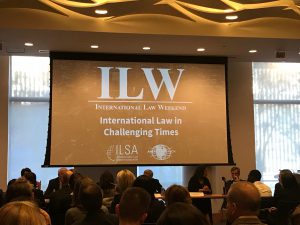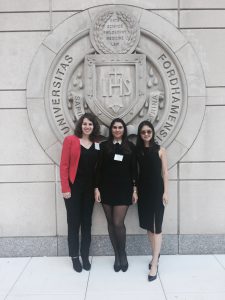By: Marianne Guéry
 I had the incredible opportunity to attend the 2017 International Law Weekend organized in New York by the American Branch of the International Law Association and the International Law Students Association. In light of the theme “International Law in Challenging Times,” the three-day conference highlighted that despite the number of challenges international law faces today – such as the risk of fragmentation due to the lack of institutional hierarchy, the need to ensure the effectiveness of international courts and tribunals, and the inadequacy between the resources allocated and the mandates conferred upon some international institutions – international law is here to stay and should be adoptive to current and future challenges. Global solutions will always be needed in today’s interlinked world, and it is essential to make people aware of the extent to which international law is relevant to their daily lives. Ambassador Elinor Hammarskjöld, Director-General for Legal Affairs at the Swedish Ministry for Foreign Affairs, mentioned that communication is essential given the “iceberg phenomenon,” in which the focus is on the current challenges while ignoring, or at least minimizing, all the positive developments achieved by international law. Professor Martin Flaherty also acknowledged that while States’ sovereignty is putting pressure on international law, the international community needs, similar to the post-World War II period, a “crisis” to reestablish a robust commitment to international law. Sovereign domestic institutions are called upon to reinvigorate and recommit to international law.
I had the incredible opportunity to attend the 2017 International Law Weekend organized in New York by the American Branch of the International Law Association and the International Law Students Association. In light of the theme “International Law in Challenging Times,” the three-day conference highlighted that despite the number of challenges international law faces today – such as the risk of fragmentation due to the lack of institutional hierarchy, the need to ensure the effectiveness of international courts and tribunals, and the inadequacy between the resources allocated and the mandates conferred upon some international institutions – international law is here to stay and should be adoptive to current and future challenges. Global solutions will always be needed in today’s interlinked world, and it is essential to make people aware of the extent to which international law is relevant to their daily lives. Ambassador Elinor Hammarskjöld, Director-General for Legal Affairs at the Swedish Ministry for Foreign Affairs, mentioned that communication is essential given the “iceberg phenomenon,” in which the focus is on the current challenges while ignoring, or at least minimizing, all the positive developments achieved by international law. Professor Martin Flaherty also acknowledged that while States’ sovereignty is putting pressure on international law, the international community needs, similar to the post-World War II period, a “crisis” to reestablish a robust commitment to international law. Sovereign domestic institutions are called upon to reinvigorate and recommit to international law.
One such panel at the conference offered a powerful illustration of how international law seeks to be both resilient and proactive in its attempt to ensure sustainable peace. Aiming at achieving justice in Syria, while the International Court of Justice is sidelined and the U.N. Security Council is paralyzed, the U.N. General Assembly established on December 21, 2016 through Resolution 71/248, the “International, Impartial and Independent Mechanism to Assist in the Investigation and Prosecution of Persons Responsible for the Most Serious Crimes under International Law Committed in the Syrian Arab Republic since March 2011” (IIIM). The IIIM appears as a model and building block for a new generation of accountability mechanisms, which has never been done in the past.

Washington University law students attending ILW 2017. From left: Marianne Guéry, Léa Garriga-Lafabregue, and Rose Lyu.
Ambassador Christian Wenaweser, Permanent Representative of Liechtenstein to the U.N., mentioned that the timing was key: the assault of Aleppo, Syria between October-November of 2016 appeared as a “leverage in public conscience” to legitimize the decision creating such an investigative entity. Catherine Marchi-Uhel, Head of the IIIM, confessed that this project was initially facing resistance and skepticism, but that it eventually appeared necessary in light of the fear that there will not be accountability for this conflict.
There has been criticism as to the decision-making process, pointing to the fact that the U.N. Security Council should have been the appropriate forum. However, as explained by Mona Khalil, former Legal Advisor at Independent Diplomat, the General Assembly has the duty to ensure that the U.N. purposes are fulfilled when the Security Council fails to do so. Considering the required respect of the Russian veto at the Security Council, equally sacred international law principles have to been preserved, including the need to hold accountable those responsible for war crimes. The IIIM thus appears to legitimately fill the gap resulting from inaction.
The IIIM’s two main tasks are, first, to collect, preserve and analyze evidence, and second, to prepare files to facilitate fair and independent criminal proceedings for the day when a court, whether national or international, will be in a position to adjudicate on these matters. In this sense, the IIIM is designed to act as a prosecution office, being conferred upon all prosecutorial powers except for the issuance of indictments. It will proactively identify the issues at stake and gather evidence in order to build cases. Presently, the team consists of nine members, but it will grow to over sixty members when fully pledged. They do not have the possibility to go to the Syrian territory yet, but information is extracted from a group of Syrian specialists formed in Syria who were the first respondents to crises in the field. There are a unique combination of actors, both professional and non-professional, acting collectively to ensure accountability for the crimes committed by all parties in the Syrian conflict. Catherine Marchi-Uhel ensures that the principles of independence and impartiality will be paramount concerns when cooperating with States and NGOs to collect information.
Lastly, the General Assembly decided that, at least initially, the IIIM will be funded exclusively by voluntary contributions, with a current amount pledge of $13 million. The sustainability of the funding has been an issue since the outset and will remain so until the IIIM becomes part of the U.N. regular financing programs.
